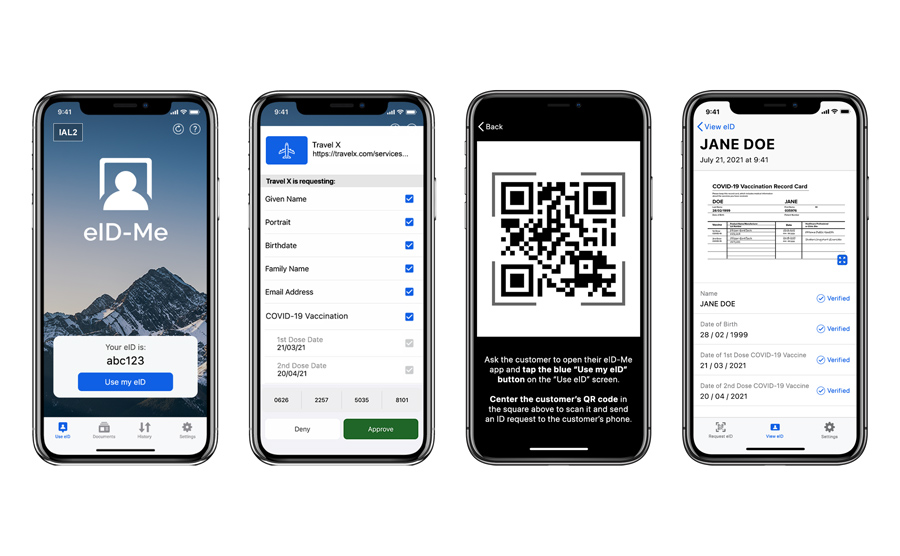
The world is in debate over COVID-19 vaccination passports. The idea of the passport is that it works like a regular travel passport, where only those who have been vaccinated have the “green pass” to travel to places and do certain activities. The thought process was to open up the economy faster to those who have been vaccinated, so they can quickly get back to “normal life”. In this blog post, we explore vaccine passport adoption, privacy concerns, and how a vaccine passport could look like in the eID-Me digital wallet.
Israel has been put on the map as one of the first countries to implement the COVID-19 vaccination passport. 81% of people over 40 are reported to be fully vaccinated and possess a digital “green pass” app. With that, they are allowed into restaurants, hotels, gyms, and other indoor venues (The Economist, 2021). There have also been discussions regarding the use of COVID-19 vaccination passports for crossing borders, but it is unknown whether it will be necessary and effective.
As like any idea that threatens the privacy, security, and freedom of the people, this passport meets criticism. Those against the vaccine and/or passport argue that it will only further fuel inequality and division between citizens, based on their race, ethnicity, socioeconomic status, and more. The use of such passports perpetuates a longer lockdown for the younger population as the older population gets vaccinated first due to their higher risk of contracting and dying from the disease. Furthermore, ethnic minorities and/or poorer citizens are more hesitant about the vaccine and have lack of access to proper testing, let alone a vaccine appointment, due to the already-present inequality ingrained within the society (Serhan, 2021). These doubts seem to have stemmed from the lack of evidence that those who are vaccinated can actually prevent themselves from being infected and/or spreading the virus to others.
While these are all legitimate arguments and concerns, we would like to focus on what we do best: privacy and security. Citizens “worry that governments may be tempted to misuse the data, and exploit the control they grant over people’s lives.” (The Economist, 2021). Higher levels are also worried about fake certificates being sold online.
How Canadians feel about a COVID-19 vaccination passport
“A new online Leger poll, commissioned by Jedwab’s ACS and the Canadian Institute for Health Research at the University of Manitoba, suggests the idea is divisive on either side of the border.
Just over half of Canadian respondents, 52 percent, said they support showing proof of vaccination to get into events or venues, compared with 43 percent of their U.S. counterparts.” (CTV News, 2021)
How would Bluink’s eID-Me come into play?
ISO’s 18013-5 contributing community has published a viable standard for an mDOC (medical document) that will ensure privacy, security, and interoperability for a digital COVID-19 vaccination passport.
While this ISO standard is commonly known to be used for an mDL (mobile drivers licence), it is believed to be flexible enough to securely encode any information in a digital wallet, and have it bound to the identity of a citizen. Most importantly, the vaccination certificate becomes “decentralized” and is available to be used anywhere, regardless of network connectivity, or lack thereof.
At Bluink, we have chosen to support ISO mDLs early in our development of eID-Me, the digital identity wallet that is now available Canada-wide. We have certificate issuance and device-to-reader modes that are required to roll out a useful mDOC solution.
How would it work with eID-Me?
After taking a selfie and scanning ID documents (passport and driver’s licence/photo card), the user’s identity information is encrypted and sent to eID-Me’s secure registration server for verification. Once verified, an eID-Me digital identity is created on the user’s smartphone using a digital certificate, which is bound to an anonymous identifier and the user’s identity information. The user then has a secure, portable digital wallet, which can be used in online and offline identity transactions. No identity information is retained on Bluink’s eID-Me servers.
Thereafter, you will be able to add additional documents into your wallet, like a digital COVID-19 vaccine certificate. Scan the card or certificate given at your dosage appointments, and your information will be verified with the institution that holds your vaccination records. In the future, once the vaccination passport system is established at venues or online sites, you may be able to use eID-Me to prove your record, using a QR-code scan, approving a request on your phone, or displaying the certificate for viewing.
It is vital that if COVID-19 vaccination passports are to be implemented and used within our society that privacy and security remain our top priorities. Our technology and solution is something that exists, and can be used for such certificates, both in identity verification and as a backup medical document.
More about eID-Me can be read on our latest news release here.
If you’re an individual interested in getting your eID-Me digital ID, you can download it here.
If you’re a business/organization interested in integrating eID-Me into your service, you can contact us here.
About Bluink
Bluink is a digital identity company headquartered in Ottawa, Canada that specializes in identity and access management and customer identity verification, using the smartphone as a strong authenticator and secure identity store. Bluink’s mission is to empower people and businesses by making secure access simple using strong digital identities. For more information, visit www.bluink.ca.
References
Serhan, Y. (April 7, 2021). The Futility of Vaccine Passports. The Atlantic. https://www.theatlantic.com/international/archive/2021/04/vaccine-passports-dont-solve-our-pandemic-problems/618521/.
The Canadian Press. (April 7. 2021). In Canada, U.S., vaccine ‘passports’ could be new point of cross-border contention. CTV News. https://www.ctvnews.ca/health/coronavirus/in-canada-u-s-vaccine-passports-could-be-new-point-of-cross-border-contention-1.5377896.
The Economist. (March 26, 2021). Can vaccine passport kick start the economy? | The Economist [Video]. YouTube. https://youtu.be/RyWdIm57fpE.